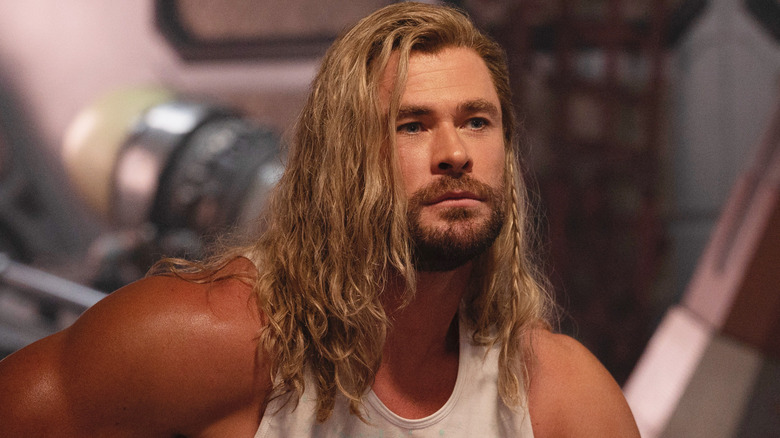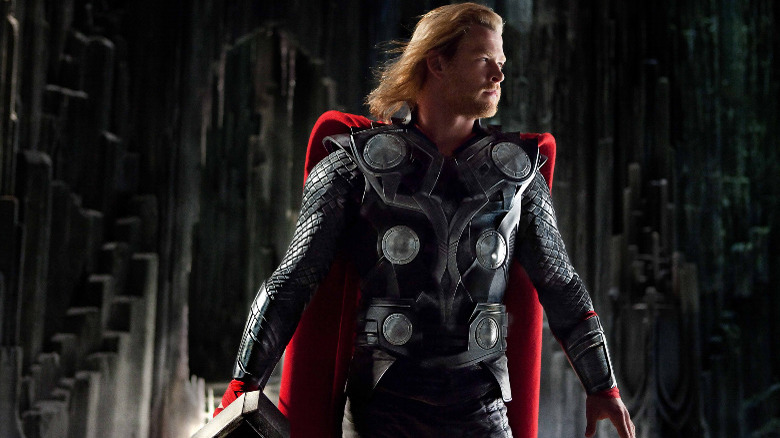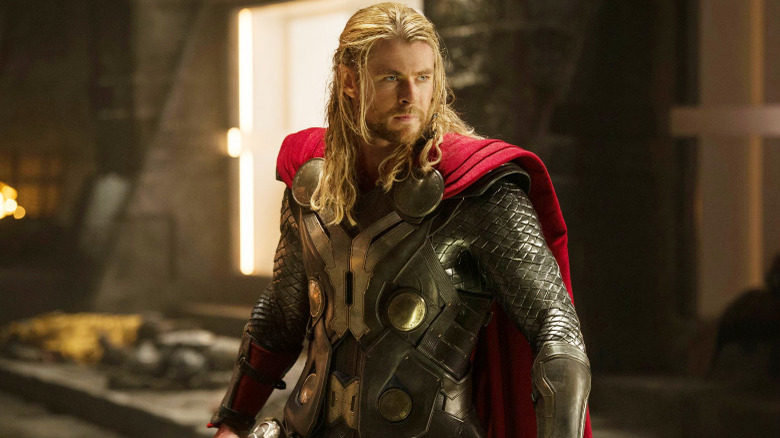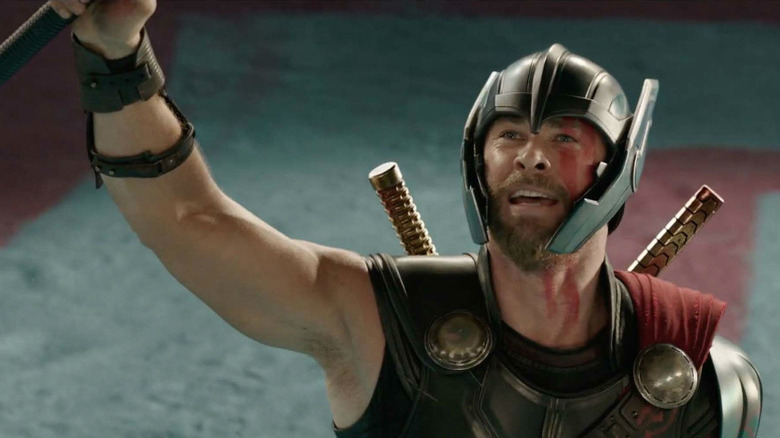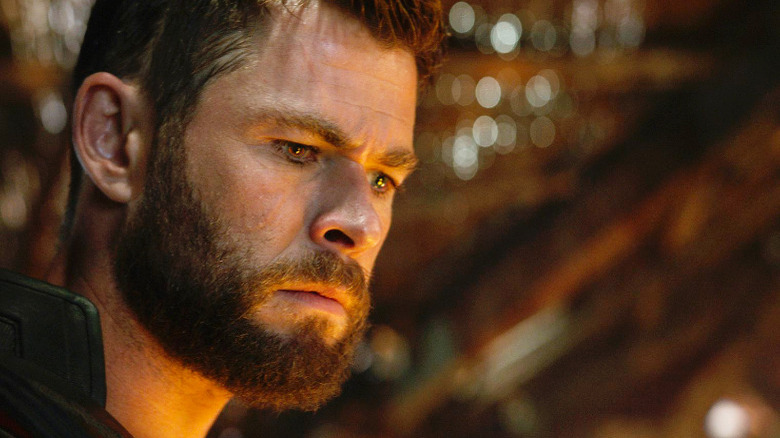What You Need To Remember Before Watching Thor: Love And Thunder
I recently sat down with my dad — who really enjoys the (underrated) first "Doctor Strange" movie — to watch the sequel "Doctor Strange in the Multiverse of Madness." It was going well until Wanda Maximoff showed up, at which my dad turned to me confused, asking, "Are we supposed to know who this is?"
Point being, keeping up with the Marvel Cinematic Universe is a full-time job. I would know because, well, it's my actual job. The franchise is 28(!) films and seven Disney+ series deep at this point. If you prefer to pick and choose which MCU projects you watch like my dad (who's never seen any of the movies and shows with Wanda), odds are you're going to come across plot points and even entire characters you've unfamiliar with. Sure, if Marvel Studios had its way, anyone with even a fleeting interest in the MCU would engage with every piece of media it's churned out since 2008. But that would've been hard enough to do once upon a time, much less when new Content™ is coming at us faster than realities fly at Michelle Yeoh in "Everything Everywhere All at Once."
With "Thor: Love and Thunder" arriving in theaters this week, it feels like a good time to help bring everyone up to speed on what's happened to the eponymous God of Thunder in the MCU so far. The film marks Chris Hemsworth's eighth time playing Thor on the big screen, which is a whole lot of backstory to keep straight for any single movie, much less one that acts as a sequel to not just the last "Thor" adventure but the greater Infinity Saga (e.g. the first 23 MCU films). Never you fear, though! We can narrow our game of catch-up down to five movies.
Thor (2011)
It feels like we're eons removed from Kenneth Branagh introducing the God of Thunder to the MCU in 2011's "Thor," with Chris Hemsworth and his peculiar dyed eyebrows playing the titular superhero. When we meet him in Branagh's film, Thor is a skilled but arrogant warrior who wouldn't hesitate to chuck his magic hammer Mjolnir at someone's face if he felt it was justified. Indeed, he barely pauses to reconsider before defying his father Odin and declaring war against the Frost Giants of Jotunheim after a handful break into Asgard. All the while, Thor's brother Loki subtly plays the devil on his shoulder.
Most of "Thor" centers on its namesake being stripped of his powers and banished to Earth by Odin for his insolence. Alone in New Mexico, Thor crosses paths with Natalie Portman's Jane Foster, an astrophysicist who's eager to learn more about where he comes from and the wormhole that brought him to our world. In time, the pair develop romantic feelings for one another as Thor slowly humbles himself and comes to see the error of his punch-first-ask-questions-later approach to diplomacy. There's also a whole lot happening back on Asgard, as Loki learns the truth about his heritage and conspires to prove he would make a better king than Thor.
"Thor" is a bit uneven — the Shakespearean drama on Asgard plays to Branagh's strengths as a director (visually and narratively) far more than the stuff on Earth. Still, it does a fine job of laying the foundation for Thor's spiritual journey in the MCU away from a life of violence and towards one of peace. It also nicely sets up Thor's family drama while establishing that being in a functional relationship with the God of Thunder is much easier said than done, as Jane comes to learn.
Thor: The Dark World
Ah, yes, "Thor: The Dark World." It's what most people seem to agree is the worst MCU film so far — a movie beset by issues even before it switched directors well into pre-production (with Alan Taylor replacing Patty Jenkins). On its own, "The Dark World" is an agreeably cheesy fantasy adventure that dials back on the emotional gravity Kenneth Branagh brought to "Thor" in favor of more flashy action scenes and Tom Hiddleston having a ball as Loki, now in full trickster mode. It's not a good film, don't get me wrong, but it is a pivotal one to Thor's story in the MCU.
Poor Jane is stuck spending most of "The Dark World" as a vessel for the film's MacGuffin — the Aether, a powerful fluid-like material that is actually the Reality Stone — while Thor and Loki begrudgingly work together to protect it from the evil Dark Elves and their leader Malekith after they storm Asgard and kill Queen Frigga. The movie also reveals Jane and Thor haven't seen each other in the two years since Thor's first trip to Earth, which doesn't bode well so far as their ability to have a long-term relationship is concerned. By the end, however, Thor declines to succeed Odin as king of Asgard after saving the day and returns to Earth to reunite with Jane, once again hoping to make things work.
If that conclusion feels like an unsatisfying payoff to all the concerns "The Dark World" raises about Thor and Jane being together, it's because it is. The film's superior, alternate ending had Jane realizing they cannot be together without jeopardizing their commitments to the larger universe. This conclusion would have also spared us an ungainly line about Thor and Jane's off-screen breakup in the third "Thor" movie.
Thor: Ragnarok
Taika Waititi's "Thor: Ragnarok" is a splendid re-invention of the "Thor" movies, carefully straddling the line between being earnest and being glib while serving up a buffet of colorful cosmic visuals and loveably off-beat new heroes like Tessa Thompson's Valkyrie. It's also the first MCU film to fully tap into Chris Hemsworth's comedic prowess, completing the God of Thunder's evolution from haughty jerk to wise-cracking, bumbling himbo. Save for a bit of clumsy but necessary exposition here and there (like the line I mentioned earlier about Thor and Jane's off-screen "mutual dumping," as Thor calls it), "Ragnarok" works nearly as well as a standalone movie as another link in the Infinity Saga chain.
"Ragnarok" pits Thor and Loki against their sister Hela, the Goddess of Death, whose existence is only revealed to them by Odin right before he passes aways. In the blink of an eye, Hela reduces Mjolnir to pieces, kills most of Thor's closest allies on Asgard (save for Jaimie Alexander's Lady Sif, who is inexplicably absent), and prepares to embark upon a campaign to conquer all of the Nine Realms. With an assist from Loki, Valkyrie, and his old work buddies Bruce Banner and Hulk, Thor makes his way back to Asgard to battle Hela, only to realize that stopping her means allowing his realm to be destroyed physically while its people are taken safely away to a new haven on Earth.
In doing all this, Thor finally reckons with Odin and Asgard's bloody legacy of colonialism against the rest of the Nine Realms — a matter the first two "Thor" movies only alluded to indirectly — and is able to begin his reign as a peaceful king, minus an eye. Well, at least until the film's post-credits scene.
Avengers: Infinity War & Endgame
We'll be here all day if we try to break down everything that happens in "Avengers: Infinity War" and "Avengers: Endgame," much less what's good and what's bad about the Russo Brothers' two-part climax to the Infinity Saga. So, for our purposes, let's just deal with Thor's arc and how it explains why the God of Thunder is suffering from a full-blown existential crisis when "Thor: Love and Thunder" begins.
Picking up right where "Thor: Ragnarok" left off, "Infinity War" opens with Thanos killing Loki and leaving Thor for dead in space to be rescued by the Guardians of the Galaxy. Determined to stop Thanos before he can claim all six Infinity Stones and wipe out half of all life in the universe, Thor sets out to secure a new weapon in the form of his battle-axe, Stormbreaker. Just as all hope seems lost when Thanos attacks Earth, Thor arrives to stab the Mad Titan in the chest ... but is unable to stop him from carrying out his horrifying plan.
Five years later, "Endgame" finds Thor lost in his grief. Despite his weakened state, he joins the other surviving Avengers on a "time heist" to undo what Thanos did. Even then, it's only after Thor travels to the past and has a heart-to-heart talk with Frigga — who helps him see his depression doesn't make him "unworthy" — that he's able to recover enough to join his fellow heroes in defeating Thanos.
Of course, Thor's journey of recovery is far from over after that. Indeed, it's unclear what the future holds for him at the end of the film when he departs Earth with the Guardians. It's here that we find him in "Thor: Love and Thunder," facing his greatest challenge yet: figuring out exactly who he is.
